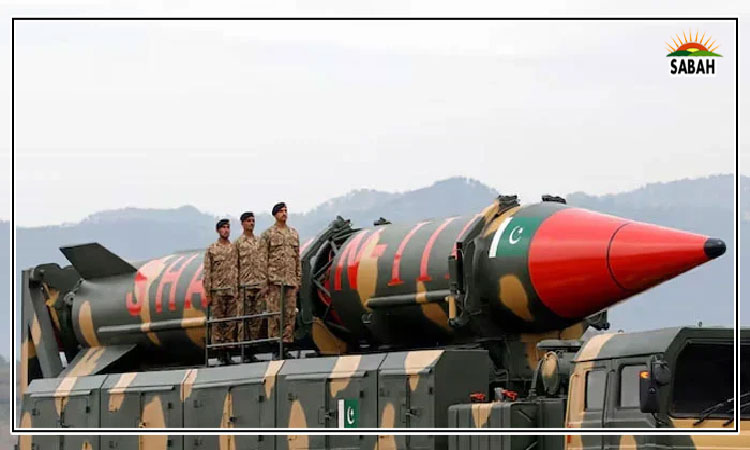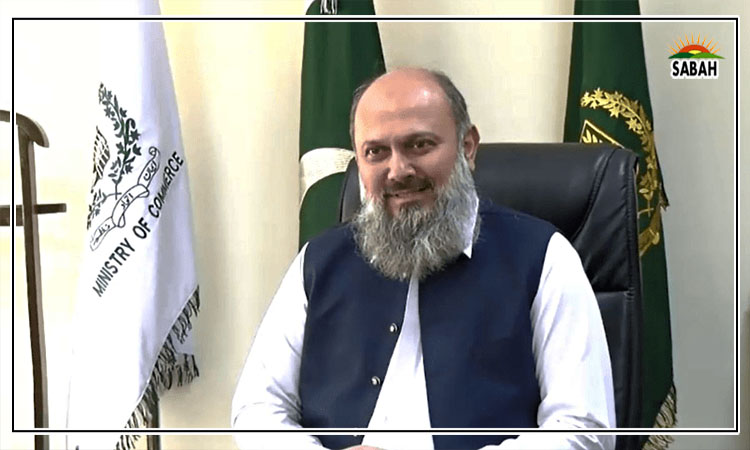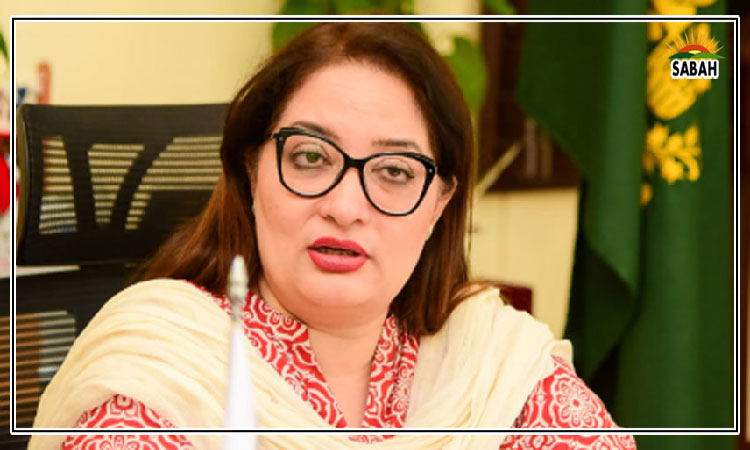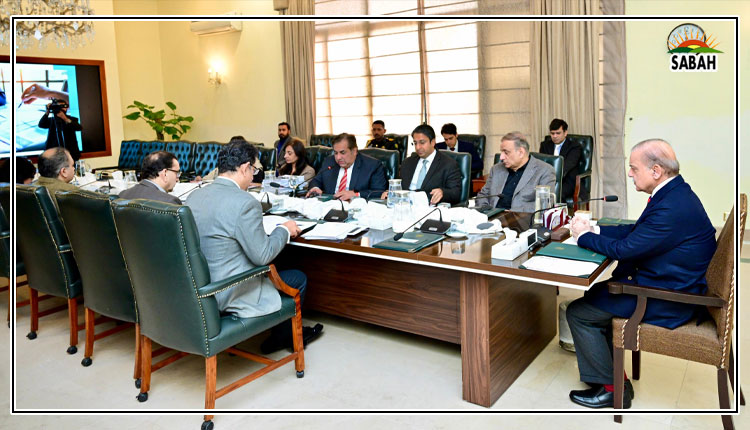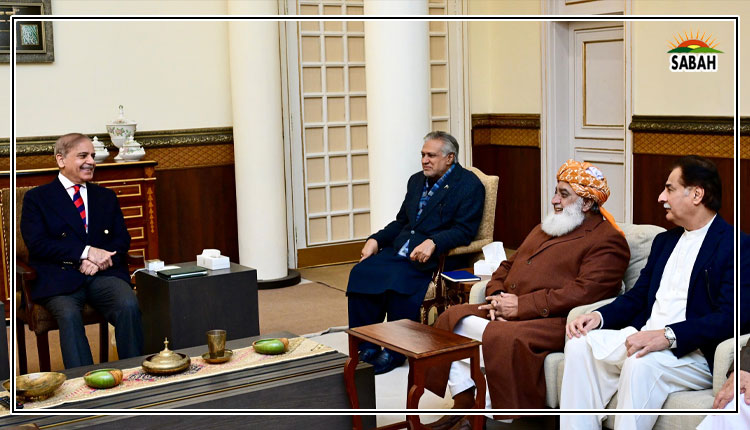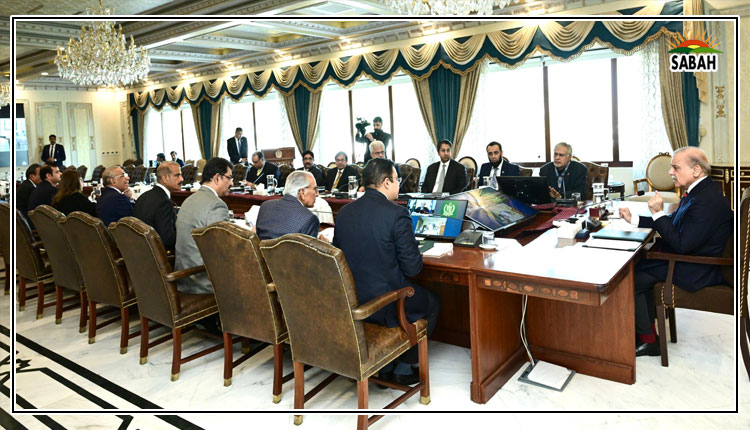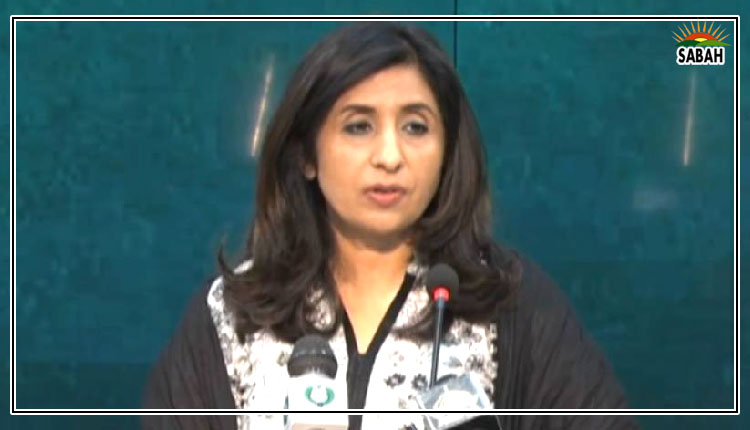FO Spokesperson says Pak, China & Iran decided to institutionalize the trilateral consultations on counter terrorism & security
ISLAMABAD, June 08 (SABAH): Foreign Office Spokesperson Mumtaz Zahra Baloch has said that Pakistan, China and Iran have decided to institutionalize the trilateral consultations on counter terrorism and security.
At her weekly media briefing in Islamabad on Thursday, Foreign Office Spokesperson Mumtaz Zahra Baloch said the understanding in this regard was reached during the first Pakistan-China-Iran Trilateral Consultation Meeting on Counter Terrorism and Security held in Beijing.
Director General Counter Terrorism, Abdul Hameed, of the Ministry of Foreign Affairs, led the Pakistan delegation in the consultation.
She said the delegations held detailed discussions on the regional security situation, particularly the threat of terrorism faced by the region.
About prevailing situation in Indian Illegally Occupied Jammu and Kashmir (IIOJK), the FO Spokesperson urged India to pay heed to the United Nations call to take preventive measures to protect children by ending the use of pellets against children. She also demanded India to heed to this call and protect the children of Kashmir from violence, displacement and trauma.
The FO Spokesperson said we are reminded of the plight of the Kashmiri children, who continue to suffer because of continued siege and brutal oppression by the Indian forces.
Mumtaz Zahra Baloch said an entire generation of Kashmiri children has grown up in a climate of fear, violence and repression. Kashmiri orphans suffer in economic hardship, isolation and psychological trauma. Scores of school children have been injured by pellets, bullets and teargas shells fired by the Indian forces. Many of them have lost their eye sight, fully or partially.
Mumtaz Zahra Baloch said Pakistan will continue to extend political, diplomatic and moral support to our Kashmiri brothers and sisters for the just and peaceful settlement of the Jammu and Kashmir dispute in accordance with the United Nations Security Council resolutions.
FO spokesperson said that Foreign Minister Bilawal Bhutto Zardari concluded his visit to Iraq on Wednesday. As Foreign Minister’s first visit to Iraq, the visit carried special significance. His programme had three key components – meetings with the political leadership and senior officials in Iraq; engagements with the business community and focus on expansion of bilateral trade and visits to religious sites and promotion of people-to-people contacts. The Foreign Minister held meetings with Iraqi leadership and held wide-ranging consultations with Deputy Prime Minister and Foreign Minister Fuad Hussein and Minister of Interior Lt. Gen. Abdulamir Kamel Al-Shammari. He met Governor of Karbala, Nassif Al-Khattabi. In Najaf he called on Grand Ayatollah Sheikh Bashir Al-Najafi. The two sides agreed to further strengthen bilateral relations and explore cooperation in the areas of water management, agriculture, textile, climate change, education, health, defence production, pharmaceutical industry, and labor mobility. The two sides also agreed on establishing sister port cities relations between Basra and Karachi and Gwadar. The Foreign Minister reaffirmed Pakistan’s support for reconstruction and rehabilitation of Iraq’s infrastructure.
She said that three MOUs were signed during the visit. These included MOU on cultural cooperation; MoU on visa abolition on diplomatic and official passports; and an MoU on cooperation between Chambers of commerce of Pakistan and Iraq.
Mumtaz Zahra Baloch said that Foreign Minister met local entrepreneurs and addressed the inaugural session of the Pakistan-Iraq Business Forum where he highlighted the potential for cooperation in fields of IT, construction, food security, energy, and medicine. He also announced creation of Pakistan – Iraq Business Council to further augment trade ties between the two countries.
She said that as announced during the visit, Pakistan will establish a Pakistani Pilgrim Centre in Kerbala and open its Consulate in Najaf to facilitate Pakistani zaireen and businessmen. For the first time in history of bilateral relations, the two sides have also agreed on a Joint Statement.
She said that Minister of State for Foreign Affairs Ms. Hina Rabbani Khar is on official visits to Norway, Sweden, Denmark and Belgium from 5th to 13th June 2023. She arrived in Sweden on Wednesday from Norway. On Thursday she will address the European Council for Foreign Relations (ECFR) Annual Council Meeting 2023 as a keynote speaker. She will present Pakistan’s perspective on challenges to regional and global security, their implications for international political order and Pakistan’s security outlook. During the course of next week the Minister of State will be proceeding to Denmark and Belgium.
Mumtaz Zahra Baloch said that the Chairman Senate of Pakistan, Muhammad Sadiq Sanjrani, is leading a delegation of the Senate of Pakistan on a four-day visit to Russia at the invitation of the Speaker of the Federation Council of the Federal Assembly of the Russian Federation, Valentina Mativenko. In Moscow, Chairman Senate has held meetings with the Russian Deputy Prime Minister Alexander Novak and Chairman of the Russian Duma Mr. Volodin. Yesterday, he addressed the members of the Russian Federation Council during the Plenary Session.
She said that during the talks the two sides agreed to further enhance parliamentary exchanges and cooperation, and strengthen mutually beneficial cooperation especially in trade, investment and energy. The two sides will continue cooperation in international forums including UN and SCO. In his address to the Plenary Session of the Russian Federation Council, Chairman Senate, underscored the positive momentum in Pakistan-Russia relations and mutual desire to expand cooperation in trade, economy, security, defense, culture, education, and people-to-people contacts. He emphasized the vital role of parliamentary cooperation and effective diplomacy in strengthening bilateral relations and resolving regional and global challenges.
She said that the visit constitutes celebrations to commemorate the 75th anniversary of establishment of diplomatic ties between Pakistan and Russia.
Mumtaz Zahra Baloch said a high-level delegation from Turkmenistan, led by Minister of State and Chairman of Turkmengas, arrived in Pakistan yesterday on a three-day visit. Talks will focus on bilateral cooperation in the energy sector including on Turkmenistan-Afghanistan-
She said that the two sides will review the progress made since the First round of the Health Dialogue held last year in Washington DC. This year’s agenda includes Pakistan’s Universal Health Coverage (UHC), Malnutrition, Infectious Diseases and Global Health Security (GHS), Pakistan-U.S. “Green Alliance”: Nexus of Climate Change, Environment and Health. The Pakistan-U.S. Health Dialogue is a manifestation of strong understanding and cooperation between Pakistan and the United States and provides a framework for cooperation in the health domain.
Mumtaz Zahra Baloch said earlier this week, the International Day for Innocent Children Victims of Aggression was observed on the 4th of June, 2023. We are reminded of the plight of the Kashmiri children who continue to suffer because of continued siege and brutal oppression by the Indian forces. An entire generation of Kashmiri children has grown up in a climate of fear, violence and repression. Kashmiri orphans suffer in economic hardship, isolation and psychological trauma. Scores of school children have been injured by pellets, bullets and teargas shells fired by the Indian forces. Many of them have lost their eye sight, fully or partially.
She said that the United Nations has called on India to take preventive measures to protect children, including by ending the use of pellets against children. We urge India to heed this call and to protect the children of Kashmir from violence, displacement and trauma.



